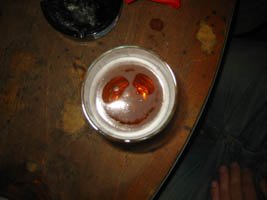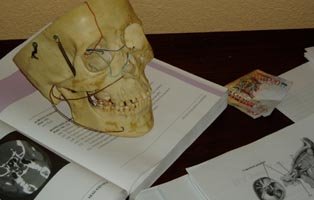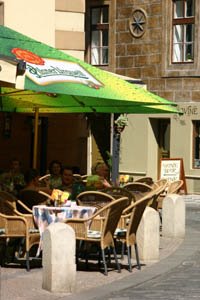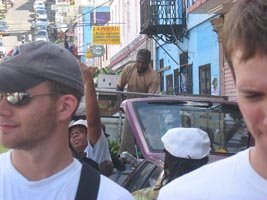Welcome to Grenada.
First off, you probably do not know how lucky you are. The surprise for each new student is how beautiful Grenada is and how anyone could keep their sanity studying in any other place. What follows is a guide to your classes and a glimpse into what your life is going to be like in Grenada. A small disclaimer: I am a white American male twenty-something who had never left the US before coming to Grenada. It is very possible that certain aspects of Grenadian life specific to women are undereported. I apologize. Now let us get started.
ARRIVING
It is GrenEHda, not GrenAHda. Pronouncing it correctly is a big deal. Grenada was described to me as a third world country before I came and this will not be your experience. Your time on campus will be indistinguishable from any university in the US; your dorm life will be no different than your undergraduate experience. Everyone uses the bus or drives a car. You will have your Subway, your TCBY Treats, movie theaters, malls, grocery stores, hardware stores, school supplies, bars and clubs. You probably will not be able to find the laundry detergent you like or fresh milk, but these are small things. Anyone who says you will be "roughing it" is lying to you.
***That being said, a few people each year have a hard time adjusting. Some have dietary concerns (it is not hard to be a vegetarian; it is hard to be a vegan). Some get very homesick or cannot adjust to Grenada's culture. The pace here is very slow. ***
The very first mistake people make when traveling to Grenada is NOT taking a layover. Often times the airlines will overbook a connecting flight from Puerto Rico to Grenada and ask that passengers volunteer to take a later flight, often the next day. TAKE IT! You will be put up in a hotel, given miles for a flight in the future, and have a chance to enjoy another island carefree.
Many students have questions about how much their luggage can weigh. American Airlines (in my experience) will tell you to bring no more than two pieces of luggage weighing 50 lbs. each and one carry-on weighing no more than 40 lbs. The problem is that your connecting flight to Grenada may only allow ONE 50 lb. piece of checked luggage and will charge you an arm and a leg to bring the other, or flatly refuse. Call ahead and make absolutely certain with an airline official that your luggage will make it to Grenada, and then get that persons' phone number.
You will likely spend your first night in Grenada without your entire luggage. This is not a big deal. The airline will give you a number to call and you will have your luggage within a day or two. Try to come to the island early so you can take full advantage of Orientation week. It is nice to have that time for settling in, to speak nothing of all of the trips around the island that are provided.
Grenada’s weather has two settings: downpour and blindingly sunny, so come to the island wearing a rain jacket over a bathing suit. Grenada is likely hotter than you are used to. During those first few days, you will break a sweat from standing, lose weight, and drink water like breathing air. You will see students going to class wearing jeans and long sleeved shirts and wonder what is wrong with them. Just know that your body is getting used to the island; it takes about a month.
WHAT DOES IT LOOK LIKE?
It's amazing how a few photographs taken by students can add some perspective to the place. Go to
Flickr and search for SGU. It says something that the students love the school enough to put all of this together themselves. My favortite albums are shot by
Josh and
Felix.
PHONE SECTION
No one gets a landline and you should not bring a cordless phone with you. So that means you are buying a cell phone. Since you are now going to travel from the mainland to Grenada and St. Vincent's (and possibly Prague) you probably want a phone that can work in all areas. For this, you need to buy a Quad-Band GSM phone. There are two main companies that offer GSM service in the USA. AT&T and Cingular are now merged into one company, and the second company is T-Mobile. So here's what you do:
1) buy a Quad-Band GSM phone from one of these companies
2) make sure that it is a pay-as-you-go phone with a SIM card
3) go to
this website and pay for your phone to be unlocked
I'll explain all of that:
There are four major broadcasting systems used throughout the world. So a Quad-Band phone means that you'll never have to buy a new phone for travel. The SIM card is a chip that contains your phone number and your contacts. Put another way, it does not matter from what phone you call: if you put your SIM card in any phone the person you are calling will see that it is you. So if you buy a SIM Quad-Band phone at home, you will have a SIM card with your home's area code. When you come to Grenada, you will buy another SIM card with a Grenadian number. At this point, you can simply switch the SIM cards while you're one the islands and then switch them back when you return home. Taping them into your passport is a nice way to keep track of them when not in use.
The reason you have to "unlock" your phone is so that your T-Mobile phone (for example) will operate with a Digicel SIM card from Grenada (for example). Pay-as-you-go means that if you want to talk for ten minutes, you buy ten minutes. If you talk over that, the phone simply cuts off (after a warning of course). This means that you cannot possibly suffer overage charges and you don't get roped into a contract. And why do you have to pay to unlock your phone? Because T-mobile doesn't want you to buy there phone and then use it with an AT&T SIM card. T-mobile wants your money. Typically, these companies will unlock your phone for free if you've owned it for three months, but if you're reading this now that's a bit of late notice. So pay to have it unlocked from a separate code vendor and you should be set.
Some students make use of internet phones as well. There are several programs that allow you to make phone calls over the internet for pennies a minute to anywhere in the world. Skype, Netphone, and PCPhone are popular programs and only require a headset with microphone.
MONEY
For the next few years you will be using Eastern Caribbean currency, or ECs. The conversion rate is easy.
$100 = 260 EC. (exact ratio is 1/2.67, but we will keep the math easy and lose the pennies)
100 EC = $40.
Ex.
I have $25 in my pocket. 25 x 2 =
50. 25 x 0.6 =
15.
50 + 15 = 65 ECA three ring binder is 35 EC. 35 x 4 =
150. 150 / 10 =
$15 (binders ARE this expensive)
There are banks on the island and no need to ever use them. You can pull EC from your US account at any ATM on the island with a VISA/MasterCard debit card (sorry American Express and Discover). Some credit card companies charge a higher rate for foreign conversions, so check yours. The ATM charge is $1.50 and the conversion rate is standard. If you have a refund check coming to you, I suggest having the school send it home and having family/friends deposit it. You will need to leave deposit slips back home. Do not forget to leave deposit slips back home. However, if you want to pay for things by check, you will have to open an account with a local bank or have traveler's checks at the ready.
How much EC will you spend a day?
Depends. EC is pretty, looks like Monopoly money and you will spend it as such. Breakfast of eggs and toast is 7 EC, lunch is around 15 EC, and dinner can be up to 20 EC. That comes to 42 EC/$17 a day, eating out every meal. It sounds expensive but few people can pull off three meals a day. Most have one full meal and fill the rest with coffee and snacks. You will find your own happy middle. Remember that if you cook and buy your own groceries, you will save quite a bit.
If you drink anything other than water, you are in for a shock. Name brands like Coke, Starbucks and Arizona drinks cost three to four times what they do in the states. That being said, some people still manage to spend a great deal of money on water. Bottled water is sold everywhere on the island and is more expensive than beer. Some students buy a bottle every day. Others (and I recommend doing this) buy one bottle and refill it at dinking fountains on campus. All of the water on campus is filtered; this is not the case elsewhere on the island. I for one have had the same bottle for a month now and may have saved as much as one million dollars. Cigarettes are no more expensive than you are used to, but you should quit anyway.
WHAT WILL EACH DAY BE LIKE?
I get up every morning around 7am and check the class schedule. Typically only two courses are taught a day with each getting two hours of lecture time. On some days you will have Anatomy lab that can begin at 8 or 9am and lasts for three hours, or you have Histology lab at 8 or 10am that lasts for two hours. Lectures begin at 1pm each day and last till 5pm. You do not need to bring much to campus. I usually put my laptop, water bottle, two three ring binders and two textbooks into my backpack and grab the bus.
Eating on campus is not hard though students do complain about the selection. At the top of the hill (you will know it well) there are vendors selling fresh fruits and the Patels selling homemade Indian food. Halfway down campus is the Student’s Center which has two restaurants (Glover’s and Pearl’s) along with a convenience store. At the base of campus is the Sugar Shack. You will not go hungry.
Time before and after lecture is often spent in the library. The library has wireless internet and so should your computer (the “Computing at SGU” section of the SGU website does a good job of preparing you). During peak hours it can be difficult to get a strong connection (bringing an Ethernet cable is a bad move, as many of the plugs on campus work sporadically). The wireless network extends throughout campus into the lecture halls (you can follow lectures online or check email during breaks), across to the bus stop and down to the Student Area (where the gym and restaurants are located). Some students are able to get a connection in their rooms as well. If you live off campus in Grand Anse dorms there is a study room with a wireless connection. High-speed internet is available in off-campus apartments through a contract with Cable & Wireless.
SCHOOL CULTURE
During your first two weeks here you have carte blanche to introduce yourself to as many people as you wish. Your class will probably go out each night that first week and I recommend you go each time. The first week does not contain difficult material and you will not have another chance like it. After this grace period the classes pick up a bit, people fall into routines and your opportunities to meet every member of your class will start to drop off.
SGU operates by four-month-long terms. This tricks you into thinking that each term is a year long and that people in second, third and fourth term are somehow separated from you. This is of course nonsense. The uppertermers will have advice for you on every class and most of it should be ignored. Instead, find a good DES tutor, give yourself a few weeks, and then start making judgments on how to handle your course load. Everyone should go to the Department of Educational Services (DES) office and take a look at all of their handouts on studying, test-taking strategies, and review sessions. It is a goldmine of helpful information.
***I am aware of the irony that, as an uppertermer, I am writing this letter of advice.***
ISLAND CULTURE
English is the language spoken in Grenada. In the school guide, they describe it as a “slightly lilting Caribbean accent”. I disagree. Those Grenadians that work with the university, or in another position that requires constant exposure to tourists and students, are easy to understand. Those that have very little exposure to foreigners can be near unintelligible, but once you have an idea for what someone is trying to say, everything seems much clearer. It is not unlike listening to lyrics from a difficult song after you have already read them in the CD jacket.
If you have a healthy sense of humor, the stressful things about Grenada can be hilarious. First off, if you go to a restaurant and read the menu, do not kid yourself and think that what is on the menu is available. The menu is instead a list of things that were once available and may be available in the future. This is due either to a lack of ingredients, the staff is too busy to make your order, or the staff does not care to make your order. So order something else with a smile.
Second, if you order a drink at a US bar and it takes more than a few moments, it is often because the place is very busy and the bar is understaffed. If you order a drink in a Grenadian bar on a dead night when you are the only customer, it will take even longer. This is not because the bartender is trying to piss you off or ruin your whole day as some dramatics will say, it is instead because the island is a slow place and you need to get used to it. That Grenadian bartender could turn to you and ask, “What’s your hurry anyway?” Try to remember that there is no hurry and life will be a lot easier on you.
SPORTS
SGU has a healthy intramural sports program. Basketball and Football (soccer to some) are the major sports (bring cleats and guards, balls are provided). Hockey is also big (played on the basketball courts, sticks and nets provided). Rounding out the selection we have Ultimate Frisbee, Dance Classes, Yoga, and Dodgeball. I have yet to see a single person play tennis (I have not even seen courts) or cricket.
WET AND DRY SEASON
The wet season is very wet and runs from August to December. It can rain for days on end. If you bring an umbrella, make sure it is the type that opens to form a complete sphere around you, because the rain falls sideways. Honestly, go to a camping store and get a waterproof cover for your backpack, a light waterproof jacket and a shamie. You will be the envy of everyone. Another thing to consider is the mosquitoes. The breeding ground for mosquitoes is standing water, and there will be a lot of it. Invest in a mesh tent for your bed and screens for your windows (only applicable if living off campus). Want to know a fun trick? Instead of a mesh net, get a standing oscillating fan. If you go to sleep with it by your head, the mosquitos get sucked into the back of it and murdered. You get to wake up the next morning with a pile of them on the ground. Good times.
There is little rain in the dry season which runs from January till June. It is the best time to be on the island and enjoy everything that it has to offer. Go to the beach, learn to kite surf, bring your surf board, or rent a jet ski. Head to the capital and learn how to haggle in the market. Most of all, remember to get a tan so that people believe you when you say that you go to school on a tropical island.
GENERAL ADVICE
1. If you are buying a computer for school, make sure that it is light, portable and has a long-lasting battery.
2. Do not get a car your first term. You first term will be spent in campus housing and the bus schedule is more than adequate. A car is a luxury.
3. Sometimes the buses can get crowded. I suggest you say goodbye to personal space.
4. About a month into the term, Prof. Goodmurphy of the Anatomy Dept. will give a note-taking lecture that is invaluable and will change the way you and your class study. Do not miss it.
5. I have yet to use a single battery.
6. You can talk to prospective and current SGU students at ValueMD.com. Most posts receive a prompt reply.
7. If you get onto a Reggae bus and want to get out at your stop, tap the metal ceiling.
WHAT TO BRING
***This is not meant to be comprehensive by any means, but instead a few things that really would have helped me. ***
Binders are expensive on the island and worth the space in your luggage to bring a few. Anatomy gives you a binder so you should only need to bring three of your own. Multicolored highlighters are invaluable when reading biochemistry and hard to find on the island. I wish I had brought more. I also wish I had brought dry erase markers. Do not bring floppy disks and blank CDs, hardly anyone uses them. Instead BRING A FLASH DRIVE. Students share all of their files and useful programs with each other via flash drives or iPods. With exception to the iPod Mini and iPod Shuffle, iPods are actually much better than flash drives. They can play music, store 20+ Gigabytes of information in any form, and are far and away worth your investment.
As for your course books, the school supplies you with them the first week you are here. They are stored at the base of campus and are heavy. I would recommend picking them up in an empty piece of wheeled-luggage. Opinion varies in the upper terms as to which textbooks are useful and which never left their shrink wrap. Take advantage of your Footsteps Buddy and try to figure out which books will be most helpful for you. That said, there are some books that most people wish they had. Check the
First-termer section.



















